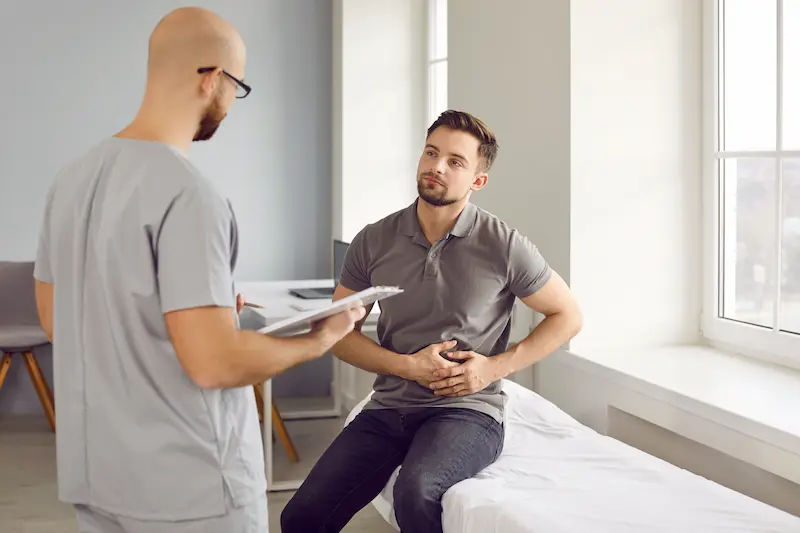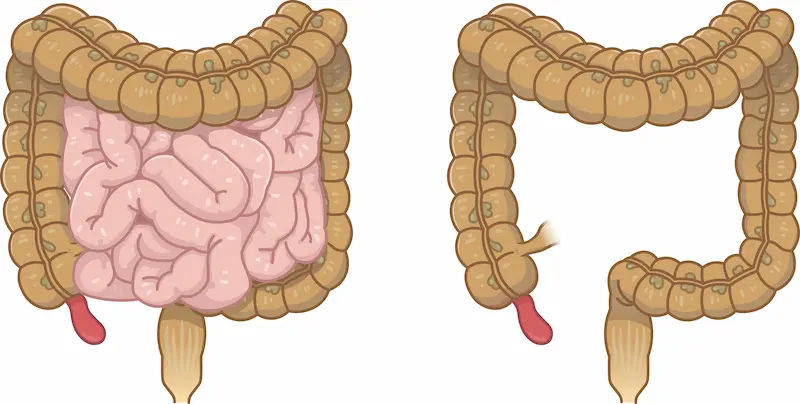Appendicitis
Learn about appendicitis, its causes, symptoms, diagnosis, and treatment options. Understand the risks, complications, and recovery process, and find tips for prevention and maintaining digestive health.

Written by Dr Sonia Bhatt
Last updated on 3rd Jul, 2025
Appendicitis is a condition in which the appendix becomes inflamed and is filled with pus. The appendix is a finger-like structure protruding out from the colon. It is often considered a vestigial organ since its function is still unknown.
Appendicitis usually starts as a dull pain around the belly button that gradually shifts to the lower right side of the abdomen. As the inflammation progresses, the pain intensifies. It becomes more severe, requiring prompt medical attention.
This article explores all there is to know about appendicitis. It will cover the symptoms, causes, diagnosis and treatment options, helping with better management.
Causes of Appendicitis
Appendicitis can happen for different reasons, though the exact cause is often unclear. Some possible causes include:
Hardened stool or growths that block the appendix opening
Swollen tissue in the appendix wall, often due to an infection in the digestive tract or another part of the body
Conditions like inflammatory bowel disease that cause inflammation
Risk Factors
Several factors can increase the risk of developing appendicitis:
Age: Appendicitis is most common in people between 10 and 30 years old, though it can occur at any age.
Sex: Men have a slightly higher risk than women.
Diet: Diets high in animal protein, saturated fat, or sodium and low in fibre are linked to a higher risk of acute appendicitis.
Family History: Having a family history of appendicitis may raise your risk, although the exact reason isn’t clear. Appendicitis can’t be inherited, but genetics could play a part to some extent in some of its causes.
Symptoms and Diagnosis
Knowing the symptoms of appendicitis can help recognise the condition faster. Here are a few symptoms and methods to diagnose it.
Common symptoms of appendicitis
Symptoms of appendicitis can include:
A low-grade fever that may increase as the condition worsens
Constipation or diarrhoea
Abdominal bloating
Sudden pain in the abdomen ( lower right side)
Pain that starts near the belly button and moves to the lower right side
Pain that may get worse with coughing, sometimes walking or during any sudden movements
Feeling nauseous or constantly vomiting
Loss of appetite
Diagnostic tests for appendicitis
To diagnose appendicitis, a healthcare professional will review symptoms and perform a physical exam. Tests used for diagnosis may include:
Physical exam: The provider may press gently on the painful area. Pain that worsens when pressure is released can indicate inflammation of the abdominal lining (peritoneum). They may also check for abdominal stiffness or muscle guarding, which occurs when the muscles tighten in response to pressure.
Rectal or pelvic exam: A gloved, lubricated finger may be used to examine the lower rectum. People of childbearing age may receive a pelvic exam to rule out other causes of pain.
Blood test: This checks for a high white blood cell count, which can signal an infection.
Urine test: A urinalysis helps rule out urinary tract infections or kidney stones as potential causes of pain.
Imaging tests: Tests like an abdominal ultrasound, CT scan, MRI, or X-ray can confirm appendicitis or identify other causes of pain.
Get Your Appendix Checked
Complications of Appendicitis
Appendicitis can lead to serious complications if not treated. These complications can develop in stages. Some of them include:
Ischemia and necrosis: It is the severe swelling in the appendix that can block its blood supply (ischemia). Without blood, the tissue becomes inflamed and starts to decay (necrosis).
Gangrene or perforation: Once tissue decay begins, infection can spread. This may happen slowly through gangrene or rapidly if the appendix tears or bursts (perforation).
Abscess or phlegmon: The infection might initially stay contained near the appendix. It may later form an abscess (a pus-filled pocket) or a phlegmon (a mass of inflamed tissue surrounding the appendix). These can rupture if untreated.
Peritonitis and spreading infection: If the infection goes to the abdominal cavity (peritonitis), it can also reach other organs. It can also enter the bloodstream (septicemia). Bloodstream infections can lead to sepsis and septic shock. Such situations are life-threatening.
Treatment Options
Treatment for appendicitis usually involves surgery to remove the appendix. Antibiotics are often given before surgery to address any infection.
An appendectomy is the surgical procedure to remove the appendix. This surgery can be done in two ways:
Open surgery (laparotomy): The surgery involves a single incision. It is about 2 to 4 inches long in the abdomen.
Laparoscopic surgery: This minimally invasive approach uses a few small incisions. Special tools and a tiny camera are inserted into the abdomen to remove the appendix.
In some cases, antibiotics alone may be enough to treat mild appendicitis. Certain individuals may recover without surgery if their condition improves with antibiotics.
Recovery and Postoperative Care
During recovery from an appendectomy, following these guidelines can help speed up the recovery process:
Keep the incision(s) clean and dry to avoid infection.
Stick to soft foods initially. This gives the digestive system time to adjust before reintroducing solid foods.
Limit physical activity, especially after open surgery, as the abdominal muscles may feel sore if the patient stands for extended periods.
Contact the healthcare provider if the patient experiences symptoms like fever or pus around the incision(s).
Prevention and Lifestyle Considerations
Preventing appendicitis may not always be possible, but making healthy choices can support overall digestive health.
A fibre-rich diet may reduce the likelihood of appendicitis. Adding the following to meals is recommended:
Oats or wheat germ as a breakfast option
Whole wheat flour instead of refined flour
Brown rice as a healthier alternative to white rice
Fresh fruits as a natural and nutritious dessert option
Try to avoid the following food items:
Processed, fried, and junk foods that are high in fat
Alcohol, which can harm the liver and disrupt digestion
Red meat, as it contains high fat and is harder to digest
Sugary items like cakes and pastries, which offer little nutritional value
Prognosis
The prognosis for appendicitis is typically positive, especially with timely treatment. Early diagnosis and an appendectomy greatly minimise the risk of complications. Most individuals recover fully within a few weeks after the procedure.
However, if appendicitis is left untreated, it can lead to severe complications like a ruptured appendix. This can cause peritonitis, an infection of the abdominal lining, or abscess formation, both of which require more intensive care and can extend recovery time.
Outcomes depend on factors such as the severity of the condition, how quickly treatment begins after symptoms appear, and the patient’s overall health. Thanks to modern medical care, the mortality rate for appendicitis remains extremely low.
Conclusion
While appendicitis is a common and potentially serious condition, timely diagnosis and treatment significantly improve outcomes. Awareness of symptoms, risk factors, and the importance of seeking medical attention can prevent complications and ensure a smooth recovery. By maintaining a healthy lifestyle and prioritising digestive health, individuals can support their overall well-being.
With advances in medical care, appendicitis is highly treatable, offering a positive prognosis for most patients when managed promptly and effectively.
Consult Top Gastroenterologists
Consult Top Gastroenterologists

Dr Bhargav Vuppumalla
General Physician/ Internal Medicine Specialist
5 Years • MBBS MD GENERAL MEDICINE
Bengaluru
Apollo Medical Center, Marathahalli, Bengaluru

Dr Harish K C
Gastroenterology/gi Medicine Specialist
15 Years • MBBS MD DM MRCP(UK) (SCE-Gastroenterology and Hepatology)
Bangalore
Manipal Hospital, Bangalore

Dr. Paramesh K N
Gastroenterology/gi Medicine Specialist
16 Years • MBBS, MS ( General Surgery), DNB ( Surgical Gastroenterology)
Hyderabad
Sprint Diagnostics Centre, Hyderabad

Dr. Shivaraj Afzalpurkar
Gastroenterology/gi Medicine Specialist
13 Years • MBBS, MD General medicine (Gold medalist), DrNB (Gastroenterology), MNAMS
Bengaluru
Apollo Clinic, JP nagar, Bengaluru

Dr Piyush Vishwakarma
Gastroenterology/gi Medicine Specialist
11 Years • MBBS, MD, DrNB,
Delhi
Apollo Hospitals Indraprastha, Delhi
.webp)


